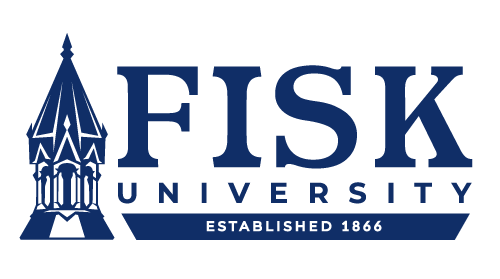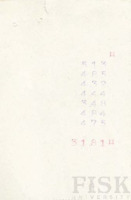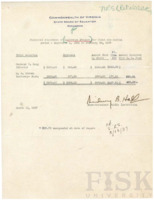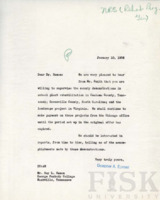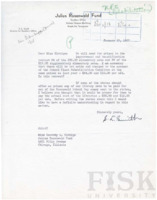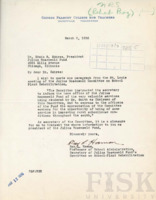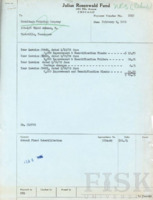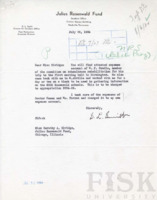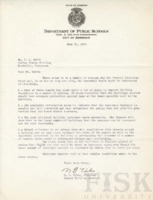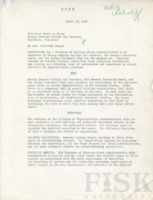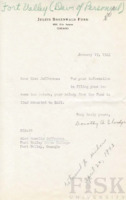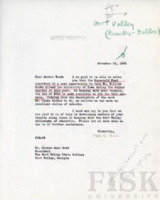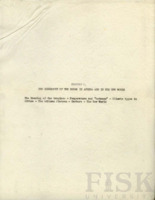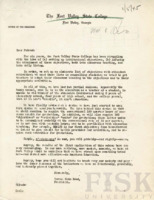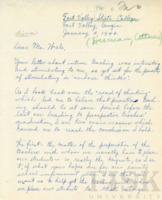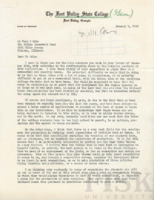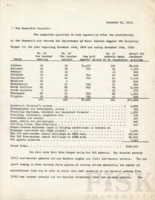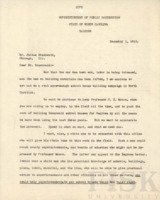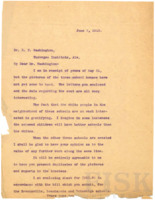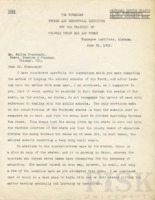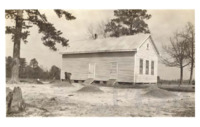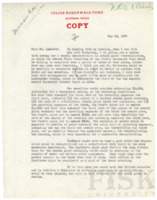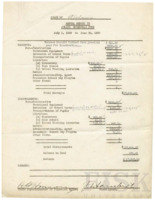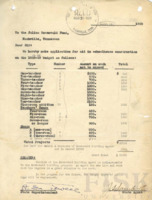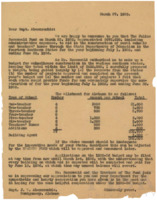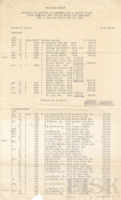Browse Items
SORT
Reports and Fund Allocations by the Julius Rosenwald Fund for the provision of Radios and Phonographs to Southern Schools
This collection is about the Julius Rosenwald Fund providing aid and funds for the purchase of radios and phonographs for schools in the Southern states.
School Beautification Initiatives, Financial Records and Reports of the Virginia State Board of Education and the Julius Rosenwald Fund (1935-1939)
This collection consists of financial statements, correspondence, and reports from the Virginia State Board of Education documenting efforts to improve and beautify school grounds from 1935 to 1939. Partially funded by the Julius Rosenwald Fund, the project emloyed landscape architect to develop plans and enhance facilities for both white and Negro schools. The records detail salaries, expenses, and contributions, as well as updates on specific schools and projects.
Correspondence on School Plant Rehabilitation and Landscape Demonstrations Supervised by Dr. Ray L. Hamon"
The collection is about correspondence regarding school plant rehabilitation projects and landscape demonstrations supervised by Dr. Ray L. Hamon.
Correspondence and Reports on School Plant Rehabilitation and Beautification Efforts by the Julius Rosenwald Fund in the Southern U.S.
This collection contains letters and reports details the Julius Rosenwald Fund's efforts in school plant rehabilitation and beautification in the Southern U.S. It includes requests for library materials, reports on expenditures for building repairs, landscaping, and educational resources, and correspondence between fund representatives and officials about project progress. The document highlights specific school improvements, such as new buildings, sanitary facilities, and landscaping, along with plans for future projects. It showed the collaboration between the Julius Rosenwald Fund, state and local education departments, and other organizations to enhance educational facilities and resources during this period.
Records of the Julius Rosenwald Fund's School Plant Rehabilitation Efforts in the Southern U.S.; Beautification, Repairs, and Educational Support
This collection documents the Julius Rosenwald Fund's collaboration with the School Plant Rehabilitation Committee to improve rural school facilities in the southern U.S. It includes records of beautification contests, financial support for repairs, library purchases, and construction projects. The collection also includes committee activities, expenses for meetings, correspondence about project planning and budgeting, and guidelines for school maintenance and landscaping.
Rural School Improvement Efforts: Financial Records and Collaborations of the Julius Rosenwald Fund and Southern Education Committees
This document contains financial records, expense reports, and correspondence related to the Julius Rosenwald Fund's school plant rehabilitation and beautification projects in the Southern U.S. It includes payment vouchers, travel expenses, and reports on school improvement efforts in counties like Coahoma and Sunflower, Mississippi. It includes funding requests, the expansion of beautification contests to include both white and Negro schools, and applications for federal aid through programs like the WPA.
Julius Rosenwald Fund: (1932-1934) Rural School Rehabilitation and Beautification Efforts
This document is a collection of the Julius Rosenwald Fund's 1934 efforts to rehabilitate and improve rural school facilities for African American students in the Southern U.S. It includes expense reports, committee activities, and correspondence related to the School Plant Rehabilitation Committee. Key initiatives include a school improvement contest to promote beautification, state and county reports on school conditions, and discussions on funding allocation for repairs and maintenance.
Maintenance and Rehabilitation for Rosenwald Schools: Correspondence and Reports (1933-1934)
This document contains correspondence and reports from state education officials to S. L. Smith, Director of the Julius Rosenwald Fund's Southern Office, between 1933 and 1934. The letters discuss the maintenance and repair of Rosenwald schools, highlighting challenges such as limited funding and incomplete projects due to federal aid withdrawal. Key recommendations include regular inspections, hiring full-time mechanics, and developing maintenance programs. The Julius Rosenwald Fund also formed a committee to assess and improve the condition of these schools through data collection and state cooperation.
Proposal for a Division of Physical-Plant Administration by George Peabody College, General Education Board, and Julius Rosenwald Fund
The document is about suggestions for a Division of Physical-Plant Administration to be supported by George Peabody College for Teachers, the General Education Board, and the Julius Rosenwald Fund for the purpose of teaching classes, conducting field extension conferences, and serving as a clearing house of information and consultant to school officials on physical-plant problems.
Correspondence, Grants and Scholarships, Fort Valley State College, 1943-1947
The collection includes correspondence and records related to the financial and personnel matters at Fort Valley State College, with a focus on scholarships, tax returns, grants, and funding for faculty. It contains communications discussing faculty funding and the departure of H. M. Bond to Lincoln University. Notable topics include the funding of faculty studies at institutions like Ohio State University. Some faculty who received funding include Mamie Pearson, Mary Clay Pinkston, Alma W. Stone, William M. Boyd, and O. E. Yokley. The collection also highlights the coordination of special programs in several counties, including Bibb, Peach, and Floyd, and the request for funding for Fort Valley's physical plant. Included are cross-references, a letter excerpt from Mr. Boyd to the Faculty-Fellowship Committee, and plans of study from faculty pursuing further education.
Correspondence and Records - Funding for Training Faculty of Fort Valley State College, 1940-1942
This curated collection comprises a series of letters, cross-reference records, payment vouchers, receipts, expenditure documents, and correspondence between the Julius Rosenwald Fund and the president of Fort Valley State College. The materials document the request for funding to support the professional development of faculty members. Notably, Mr. William Banks is allocated funds to attend the University of Iowa for advanced studies in agriculture and cooperative methods, with Mr. James Murfree designated to take his place at Fort Valley. Other individuals supported by the fund include Mr. Lawrence A. Jones, approved for study in Mexico, Miss Allee James, Mr. E. J. Adkins (who studied at Fisk University), Miss Ursula Pollad, Mr. W. H. Pipes, Mr. Shelton (replacing Mr. Matthew Fairfax), and Miss Ines D. Jenkins, who was funded to study at the University of Chicago.
Manuscript and Corespondence regarding "The Negro In Africa and America", 1942
This collection contains a manuscript for the textbook "The Negro in Africa and America", written in 1942, intended for use in a newly established course at the Army Institute, University of Wisconsin. The course was conceived at the suggestion of Dr. Bond and the textbook written by him. It also includes correspondence, vouchers, telegrams, and cross-reference records.
Correspondence and Records, Fort Valley State College, 1945-1948
This collection highlights Dr. H. M. Bond's plans for setting up and infusing the attainment of the institutional objectives at Fort Valley State College. It specifically includes a 54-page document titled "An Experimental Manual and Guide for Teachers, Advisors, House Counselors, Special Officers, and Students at Fort Valley State College," which outlines methods for measuring the achievement of these objectives. Additionally, it contains correspondence between H. M. Bond, W. W. Alexander, Fred G. Wale, Miss Eleanor Nakagawa, and Miss Dorothy Elvidge regarding various topics related to Fort Valley State College. These include the Ham Show and Folk Festival held on March 9-11, 1945, grant aid to bring Thomas N. Roberts to Fort Valley, a $500 grant to assist in planning a building project based on functional designs, and the delivery of books titled "The Goolibah Tree", "Let's Cook Lunch", "Out Under the Sky", "Plainville, USA", and "Henry's Secret" to Fort Valley State College. The collection also includes discussions on an initiative to start a project for collecting rare and valuable volumes at Negro schools, which could potentially be managed by someone at Fisk University. The collection also contains a copy of an address delivered by Horace Mann Bond at radio station WMAZ on April 18, 1945, titled "What the San Francisco Conference Means to the Negro". Additionally, it includes copies of invitation flyers for the 6th annual Hubbard Day celebration at Fort Valley State College, the official journal of the Georgia Teachers and Educational Association titled "The Herald", and invitation flyers for the 5th Baccalaureate and Commencement Exercises at Fort Valley State College on May 27, 1945. Also included are copies of the weekly calendar of events for January 25–February 1, 1946, and April 12–19, 1946, at Fort Valley State College. The collection features a booklet addressing the institutional needs of Fort Valley State College, presented to Georgia legislators during their visit on May 10, 1945, as well as a copy of the Report of the President of Fort Valley State College, 1944–1945. The collection also contains discussions on initiating a program for the organization and development of Mexican-American leadership in the United States, as well as a list of committee members for the Georgia Committee on Cooperation in Teacher Education Meeting, held on May 11-12, 1945. The collection also contains letters from C. L. Spelman and Mr. Fred G. Wale to Chancellor S. V. Sanford and Mr. Edwin E. Embree, respectively, expressing their interest in the position of president at Fort Valley State College should Dr. H. M. Bond leave his role. Additionally, it includes correspondence discussing the appointment of Cornelius V. Troup as the new president of Fort Valley State College. The collection also contains documents analyzing data on fourth-year graduates at Fort Valley State College, as well as correspondence regarding the establishment of graduate programs in agriculture, education, and home economics at the instituition.
Correspondence and Records, Fort Valley State College, 1944
This collection includes newsletters such as the February issue of the Herald, documenting key events like the development of teacher training programs and proposed workshop plans for Spalding County by Superintendent Gaskins. Also highlighted are important initiatives like a proposed on-field project in Bibb County and a special invitation for Bond to teach summer school at Garrett Biblical Institute, following a recommendation by Dr. Embree.
The collection provides detailed insight into Fort Valley’s involvement with local and national radio broadcasts, including WMAZ's candidacy for the prestigious George Foster Peabody Radio Award and NBC’s proposal to nationalize a local radio program. It also features a significant telegram correspondence and newspaper clippings, including a notable report on Henry A. Hunt’s appointment as the Director of Special Services for Negro Farmers.
In addition, the collection sheds light on cultural and academic matters, such as the planned visit by Dr. Wale to Fort Valley following the Ham Show and Folk Festival, as well as the efforts of the Penland School of Handicrafts to establish a three-week program in the area. Contributions by influential figures like Dr. Kenneth Clark, Dr. Wale, and Catherine Duncan's offer from Southern University provide further depth, demonstrating a network of intellectual and professional growth.
The collection also includes detailed financial documents such as checks, credit vouchers, and analysis reports on graduating students at Fort Valley, alongside a rich history of outreach programs, educational workshops, and significant community events from October to November of 1944. Other notable items include a manuscript titled Henry’s Secret, a call for a ship to be named after Henry A. Hunt, and an analysis on possible appointments, including W.E.B. Du Bois.
Correspondence, Fort Valley State College, 1943
This collection encompasses a rich array of correspondence and documents that offer a detailed glimpse into the history and development of Fort Valley State College. It includes letters, telegrams, and radio broadcast scripts, along with newspaper articles covering topics like gardening, food preservation, and the Pleasant Hill Gardens. The collection also highlights notable visitors such as Miss Hermese Johnson, Charlotte Hawkins Brown, Allee W. James, and Henry R. Luce, as well as significant figures like Josephine Heriot Dibble Murphy and Charles S. Johnson.
Additional materials in the collection include event planning documents, such as weekly calendars, proposals for summer workshops at Camp John Hope, and a tribute to the 50th birthday of Charles S. Johnson. Among the key documents are plans for establishing educational programs, such as proposals to the General Education Board, and efforts to expand the college’s cultural resources, including recommendations by Hale Woodruff and efforts to acquire objects of art from Flint River Farms. The materials also cover various celebrations, including the Hubbard Day festivities and plans for securing the services of McKissack & McKissack, offering a comprehensive view of the college’s efforts in community engagement, cultural development, and educational advancement.
Budget and Correspondence Related to Educational Funding, 1918–1919
This collection contains budget proposals and correspondence from November 14, 1918, to November 14, 1919, concerning the allocation of funds to Rosenwald schools. Key figures include Dr. Fletcher B. Dresslar, the secretary to Julius Rosenwald, and representatives of the Tuskegee Normal and Industrial Institute.
Materials detail funding strategies, school construction plans, teacher hiring, and financial audits, with a focus on specific states.
Plans for Building New Schoolhouses in North Carlina
This collection contains plans to build school houses in North Carolina. This includes reports, as well as requisition, for 13 schools that have qualified for aid and the number that have already been paid. There are also checks disbursed by the Julius Rosenwald fund
Report of Funds Allocated to Roenwald Schools in 1914
This collection contains correspondence between Mr. Booker T. Washington, Mr. William C. Graves, and Mr. Julius Rosenwald about the funds and expenses regarding the Rosenwald schools as of 1914.
Plans to further support Rural Education in Alabama
This collection contains correspondence between Mr. Julius Rosenwald and Mr. Booker T. Washington about the efforts to funding schools in Alabama. This also includes report on the activities of the Rosenwald schools in Alabama as of 1913, and there is a plan to raise more rural schoolhouses
Correspondence about Rosenwald Day 1933
This collection contains school reports and pictures of the rehabilitated Noatasulga and Loachaboka Rosenwald schools as of 1938. There is also correspondence between Mr. S. L. Smith and Mr. J. S. Lambert about a report on schools that took part in Rosenwald Day 1933.
School Plant Rehabilitation Program in Alabama
This collection contains correspondence to and fro Mr. S. L. Smith and Mr. J. S. Lambert regarding the school plant rehabilitation program in Alabama. The schools being rehabilitated are the Loachapoka and Noatasulga Rosenwald schools, which occured spanned 1937-1938. There was also mention of a celebration to take place on November 16, 1937.
Reports and Correspondence, Julius Rosenwald Fund, 1929–1932
This collection contains documents such as the Annual Report to the Julius Rosenwald Fund covering the period from July 1, 1929 to June 30, 1932, the 1930–1931 construction budget, a 1930–1931 request for aid to the Fund, and correspondence related to the rebuilding of the Montgomery County Training School.
Schoolhouse and Library Support Records, 1928-1929
This collection contains applications for aid in schoolhouse construction under the 1928–1929 and 1929–1930 budgets, records of fund appropriation by the Julius Rosenwald Fund for various aspects of Negro schools in the South, and support for 280 libraries in Rosenwald schools across the region. It also contains financial statements for the Julius Rosenwald Library Fund in Alabama from July 1, 1928 to June 30, 1929, and records of checks disbursed.
Alabama School Construction Records
This collection contains correspondence between the Julius Rosenwald Fund and the Alabama Department of Education regarding fund appropriation for the construction of Negro schoolhouses, teachers’ homes, classroom additions, and shops. It includes correspondence on schools planned for construction in the year beginning July 1, 1926, a statement on the status of Rosenwald building projects in Alabama for the year ending June 30, 1927, and cross-reference records.
Correspondence between Alabama DOE and the Julius Rosenwald Fund and Finanial statements of the Julius Rosenwald fund for building and managing schools
This collection contains financial and administrative documents related to the Julius Rosenwald Fund’s support of education in Alabama and other Southern states. Materials include financial reports for the years July 1, 1925–June 30, 1926 and July 1, 1927–June 30, 1928, a report on the 1928–1929 Rosenwald Day Program in Alabama, and the 1919–1920 budget for the Julius Rosenwald Rural School Fund. Also included is correspondence between the Alabama State Department of Education and the Rosenwald Fund concerning funding to extend school terms in Rosenwald schools across 14 states, financial statements for the Fund, a status report on Rosenwald building projects in Alabama for 1927–1928, and a list of old budget schools aided through Tuskegee Institute.
